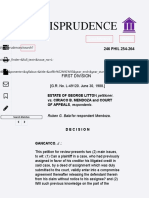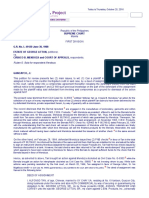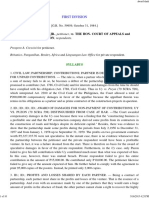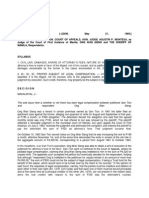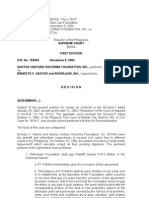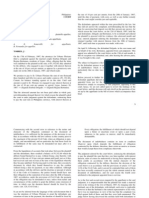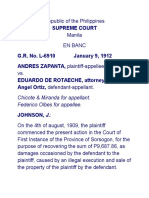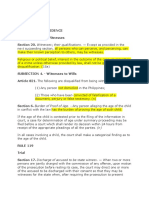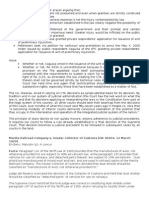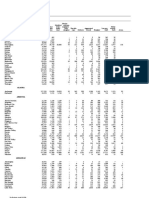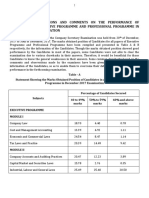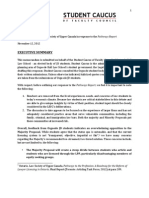Gancayco, J.:: 56850, C.F.I., Manila, Authorizing Alfonso Tan To Withdraw
Gancayco, J.:: 56850, C.F.I., Manila, Authorizing Alfonso Tan To Withdraw
Uploaded by
Mark MlsCopyright:
Available Formats
Gancayco, J.:: 56850, C.F.I., Manila, Authorizing Alfonso Tan To Withdraw
Gancayco, J.:: 56850, C.F.I., Manila, Authorizing Alfonso Tan To Withdraw
Uploaded by
Mark MlsOriginal Description:
Original Title
Copyright
Available Formats
Share this document
Did you find this document useful?
Is this content inappropriate?
Copyright:
Available Formats
Gancayco, J.:: 56850, C.F.I., Manila, Authorizing Alfonso Tan To Withdraw
Gancayco, J.:: 56850, C.F.I., Manila, Authorizing Alfonso Tan To Withdraw
Uploaded by
Mark MlsCopyright:
Available Formats
duly submitted to the court, with notice to the parties.
8 The
deed of assignment was framed in the following tenor:
GANCAYCO, J.:
DEED OF ASSIGNMENT
This petition for review presents two (2) main issues, to wit:
(1) Can a plaintiff in a case, who had previously assigned in
favor of his creditor his litigated credit in said case, by a deed
of assignment which was duly submitted to the court, validly
enter into a compromise agreement thereafter releasing the
defendant therein from his claim without notice to his
assignee? and (2) Will such previous knowledge on the part of
the defendant of the assignment made by the plaintiff estop
said defendant from invoking said compromise as a ground for
dismissal of the action against him?
The present case stemmed from Civil Case No. Q8303 1 entitled "Alfonso Tan vs. Ciriaco B. Mendoza," an
action for the collection of a sum of money representing the
value of two (2) checks which plaintiff Tan claims to have
been delivered to him by defendant Mendoza, private
respondent herein, by way of guaranty with a commission.
The record discloses that the Bernal spouses 2 are engaged in
the manufacture of embroidery, garments and cotton materials.
Sometime in September 1963, C.B.M. Products, 3 with
Mendoza as president, offered to sell to the Bernals textile
cotton materials and, for this purpose, Mendoza introduced the
Bernals to Alfonso Tan. Thus, the Bernals purchased on credit
from Tan some cotton materials worth P 80,796.62, payment
of which was guaranteed by Mendoza. Thereupon, Tan
delivered the said cotton materials to the Bernals. In view of
the said arrangement, on November 1963, C.B.M. Products,
through Mendoza, asked and received from the Bernals PBTC
Check No. 626405 for P 80,796.62 dated February 20, 1964
with the understanding that the said check will remain in the
possession of Mendoza until the cotton materials are finally
manufactured into garments after which time Mendoza will
sell the finished products for the Bernals. Meanwhile, the said
check matured without having been cashed and Mendoza
demanded the issuance of another check 4 in the same amount
without a date.
On the other hand, on February 28, 1964, defendant Mendoza
issued two (2) PNB checks 5 in favor of Tan in the total
amount of P 80,796.62. He informed the Bernals of the same
and told them that they are indebted to him and asked the
latter to sign an instrument whereby Mendoza assigned the
said amount to Insular Products Inc. Tan had the two checks
issued by Mendoza discounted in a bank. However, the said
checks were later returned to Tan with the words stamped
"stop payment" which appears to have been ordered by
Mendoza for failure of the Bernals to deposit sufficient funds
for the check that the Bernals issued in favor of Mendoza.
Hence, as adverted to above, Tan brought an action against
Mendoza docketed as Civil Case No. Q-8303 6 while the
Bernals brought an action for interpleader docketed as Civil
Case No. 56850 7 for not knowing whom to pay. While both
actions were pending resolution by the trial court, on March
20, 1966, Tan assigned in favor of George Litton, Sr. his
litigatious credit * in Civil Case No. 56850 against Mendoza,
I, ALFONSO TAN, of age, Chinese, married to UY CHAY
UA, residing at No. 6 Kanlaon, Quezon City, doing business
under the name and style ALTA COMMERCIAL by way of
securing or guaranteeing my obligation to Mr. GEORGE
LITTON, SR., do by these presents CEDE, ASSIGN,
TRANSFER AND CONVEY unto the said Mr. GEORGE
LITTON, SR., my claim against C.B.M. Products, Inc.,
personally guaranteed by Mr. Ciriaco B. Mendoza, in the
amount of Eighty-Thousand Seven Hundred Ninety Six Pesos
and Sixty-two centavos (P 80,796.62) the balance of which, in
principal, and excluding, interests, costs, damages and
attorney's fees now stands at P 76,000.00, P 4,796.62, having
already been received by the assignor on December 23, 1965,
pursuant to the order of the court in Civil Case No.
56850, C.F.I., Manila, authorizing Alfonso Tan to withdraw
the amount of P 4,796.62 then on deposit with the court. All
rights, and interests in said net amount, plus interests and
costs, and less attorney's fees, in case the amount allowed
therefor be less than the amounts claimed in the relief in Civil
Case 56850 (C.F.I., Manila) and Q-8503 (C.F.I., Quezon City)
are by these presents covered by this assignment.
I further undertake to hold in trust any and all amounts which
may hereafter be realized from the aforementioned cases for
the ASSIGNEE, Mr. GEORGE LITTON, SR., and to turn over
to him such amounts in application to my liability to him, as
his interest may then show, and I further undertake to
cooperate towards the successful prosecution of the
aforementioned cases making available myself, as witness or
otherwise, as well as any and all documents thereto
appertaining. ... 9
After due trial, the lower court ruled that the said PNB checks
were issued by Mendoza in favor of Tan for a commission in
the sum of P 4,847.79 and held Mendoza liable as a drawer
whose liability is primary and not merely as an indorser and
thus directed Mendoza to pay Tan the sum of P 76,000.00, the
sum still due, plus damages and attorney's fees. 10
Mendoza seasonably filed an appeal with the Court of
Appeals, dockted as C.A. G.R. No. 41900-R, arguing in the
main that his liability is one of an accommodation party and
not as a drawer.
On January 27, 1977, the Court of Appeals rendered a decision
affirming in toto the decision of the lower court. 11
Meanwhile, on February 2, 1971, pending the resolution of the
said appeal, Mendoza entered into a compromise agreement
with Tan wherein the latter acknowledged that all his claims
against Mendoza had been settled and that by reason of said
settlement both parties mutually waive, release and quit
whatever claim, right or cause of action one may have against
the other, with a provision that the said compromise agreement
shall not in any way affect the right of Tan to enforce by
appropriate action his claims against the Bernal spouses. 12
On February 25, 1977, Mendoza filed a motion for
reconsideration praying that the decision of January 27, 1977
be set aside, principally anchored upon the ground that a
compromise agreement was entered into between him and Tan
which in effect released Mendoza from liability. Tan filed an
opposition to this motion claiming that the compromise
agreement is null and void as he was not properly represented
by his counsel of record Atty. Quiogue, and was instead
represented by a certain Atty. Laberinto, and principally
because of the deed of assignment that he executed in favor of
George Litton, Sr. alleging that with such, he has no more
right to alienate said credit.
While the case was still pending reconsideration by the
respondent court, Tan, the assignor, died leaving no properties
whatever to satisfy the claim of the estate of the late George
Litton, Sr.
In its Resolution dated August 30, 1977, 13 the respondent
court set aside its decision and approved the compromise
agreement.
As to the first ground invoked by Tan, now deceased, the
respondent court ruled that the non-intervention of Tan's
counsel of record in the compromise agreement does not affect
the validity of the settlement on the ground that the client had
an undoubted right to compromise a suit without the
intervention of his lawyer, citing Aro vs. Nanawa. 14
As to the second ground, respondent court ruled as follows:
... it is relevant to note that Paragraph 1of the deed of
assignment states that the cession,assignment, transfer, bond
conveyance by Alfonso Tan was only by way of securing, or
guaranteeing his obligation to GEORGE LITTON, SR.
the amount sued in Civil Case No. Q-8303, in relation to Civil
Case No. 56850.
Before resolving the main issues aforementioned, the question
of legal personality of herein petitioner to bring the instant
petition for review, must be resolved.
As a rule, the parties in an appeal through a review on
certiorari are the same original parties to the case. 16 If after
the rendition of judgment the original party dies, he should be
substituted by his successor-in-interest. In this case, it is not
disputed that no proper substitution of parties was done. This
notwithstanding, the Court so holds that the same cannot and
will not materially affect the legal right of herein petitioner in
instituting the instant petition in view of the tenor of the deed
of assignment, particularly paragraph two thereof 17 wherein
the assignor, Tan, assumed the responsibility to prosecute the
case and to turn over to the assignee whatever amounts may be
realized in the prosecution of the suit.
We note that private respondent moved for the dismissal of the
appeal without notifying the estate of George Litton, Sr.
whereas the former was fully aware of the fact that the said
estate is an assignee of Tan's right in the case
litigated. 18 Hence, if herein petitioner failed to observe the
proper substitution of parties when Alfonso Tan died during
the pendency of private respondent's motion for
reconsideration, no one is to blame but private respondent
himself. Moreover, the right of the petitioner to bring the
present petition is well within the concept of a real party-ininterest in the subject matter of the action. Well-settled is the
rule that a real party-in-interest is a party entitled to the avails
of the suit or the party who would be injured by the
judgment. 19 We see the petitioner well within the latter
category.
Hence, Alfonso Tan retained possession and dominion of the
credit (Par. 2, Art. 2085, Civil Code).
Hence, as the assignee and successor-in-interest of Tan,
petitioner has the personality to bring this petition in
substitution of Tan.
"Even considered as a litigations credit," which indeed
characterized the claims herein of Alfonso Tan, such credit
may be validly alienated by Tan (Art. 1634. Civil Code).
Now, the resolution of the main issues.
Such alienation is subject to the remedies of Litton under
Article 6 of the Civil Code, whereby the waiver, release, or
quit-claim made by plaintiff-appellee Alfonso Tan in favor of
defendant-appellant Ciriaco B. Mendoza, if proven prejudicial
to George Litton, Sr. as assignee under the deed of assignment,
may entitle Litton to pursue his remedies against Tan.
The alienation of a litigatious credit is further subject to the
debtor's right of redemption under Article 1634 of the Civil
Code.
As mentioned earlier, the assignor Tan died pending resolution
of the motion for reconsideration. The estate of George Litton,
Sr., petitioner herein, as represented by James Litton, son of
George Litton, Sr. and administrator 15 of the former's estate, is
now appealing the said resolution to this Court as assignee of
The purpose of a compromise being to replace and terminate
controverted claims, 20 courts encourage the same. A
compromise once approved by final order of the court has the
force of res judicata between parties and should not be
disturbed except for vices of consent or forgery. 21
In this case, petitioner seeks to set aside the said compromise
on the ground that previous thereto, Tan executed a deed of
assignment in favor of George Litton, Sr. involving the same
litigated credit.
We rule for the petitioner. The fact that the deed of assignment
was done by way of securing or guaranteeing Tan's obligation
in favor of George Litton, Sr., as observed by the appellate
court, will not in any way alter the resolution on the matter.
The validity of the guaranty or pledge in favor of Litton has
not been questioned. Our examination of the deed of
assignment shows that it fulfills the requisites of a valid
pledge or mortgage. 22Although it is true that Tan may validly
alienate the litigatious credit as ruled by the appellate court,
citing Article 1634 of the Civil Code, said provision should
not be taken to mean as a grant of an absolute right on the part
of the assignor Tan to indiscriminately dispose of the thing or
the right given as security. The Court rules that the said
provision should be read in consonance with Article 2097 of
the same code. 23 Although the pledgee or the assignee, Litton,
Sr. did not ipso factobecome the creditor of private respondent
Mendoza, the pledge being valid, the incorporeal right
assigned by Tan in favor of the former can only be alienated
by the latter with due notice to and consent of Litton, Sr. or his
duly authorized representative. To allow the assignor to
dispose of or alienate the security without notice and consent
of the assignee will render nugatory the very purpose of a
pledge or an assignment of credit.
Moreover, under Article 1634, 24 the debtor has a
corresponding obligation to reimburse the assignee, Litton, Sr.
for the price he paid or for the value given as consideration for
the deed of assignment. Failing in this, the alienation of the
litigated credit made by Tan in favor of private respondent by
way of a compromise agreement does not bind the assignee,
petitioner herein.
Indeed, a painstaking review of the record of the case reveals
that private respondent has, from the very beginning, been
fully aware of the deed of assignment executed by Tan in
favor of Litton, Sr. as said deed was duly submitted to Branch
XI of the then Court of First Instance of Manila in Civil Case
No. 56850 (in relation to Civil Case No. Q-8303) where
C.B.M. Products is one of the defendants and the parties were
notified through their counsel. 25 As earlier mentioned, private
respondent herein is the president of C.B.M. Products, hence,
his contention that he is not aware of the said deed of
assignment deserves scant consideration from the Court.
Petitioner pointed out at the same time that private respondent
together with his counsel were served with a copy of the deed
of assignment which allegation remains uncontroverted.
Having such knowledge thereof, private respondent is
estopped from entering into a compromise agreement
involving the same litigated credit without notice to and
consent of the assignee, petitioner herein. More so, in the light
of the fact that no reimbursement has ever been made in favor
of the assignee as required under Article 1634. Private
respondent acted in bad faith and in connivance with assignor
Tan so as to defraud the petitioner in entering into the
compromise agreement.
Manila Banking Corp. v Anastacio Teodoro, Jr. and Grace
Teodoro
Bidin, J. | 1989
1.
2.
3.
4.
5.
6.
April 1966, Spouses Teodoro together with Teodoro Sr
executed a PN in favour of Manila Banking Corp (MBC);
- Payable within 120 days (until Aug), with 12%
interest per annum;
- They failed to pay and left balance of 15k as of
September 1969;
May and June 1966, executed two PNs;
- 8k and 1k respectively payable within 120 days and
12% per annum;
- They made partial payment but still left 8.9k balance
as of September 1969;
It appears than in 1964, Teodoro Jr executed a Deed of
Assignment of Receivables in favour of MBC from
Emergency Employment Administration;
- Amounted to 44k;
- The deed provided it was for consideration of certain
credits, loans, overdrafts and other credit
accommodations extended to the spouses and
Teodoro Sr as security for the payment of said sum
and interest thereon; and that they release and
quitclaim all its rights, title and interest in the
receivables;
In the stipulations of fact, it was admitted by the parties:
- That MBC extended loans to the spouses and
Teodoro Jr because of certain contracts entered into
by latter with EEA for fabrication of fishing boats
and that the Philippine Fisheries Commission
succeeded EEA after its abolition;
- That non-payment of the PNs was due to failure of
the Commission to pay spouses;
- That the Bank took steps to collect from the
Commission but no collection was effected;
For failure of the spouses and Teodor Sr to pay, MBC
instituted against them;
- Teodoro Sr subsequently died so suit only against the
spouses;
TC favoured MBC; MFR denied;
- Spouses appealed to CA but since issue pure question
of law, CA forwarded to SC;
WHEREFORE, the petition is GRANTED. The assailed
resolution of the respondent court dated August 30,1977 is
hereby SET ASIDE, the said compromise agreement being
null and void, and a new one is hereby rendered reinstating its
decision dated January 27, 1977, affirming in toto the decision
of the lower court. This decision is immediately executory. No
motion for extension of time to file a motion for
reconsideration will be granted.
Issues:
SO ORDERED.
Ratio:
W/N the assignment of receivables has the effect of
payment of all the loans contracted by the spouses; No.
W/N MBC must exhaust all legal remedies against PFC
before it can proceed against the spouses. No
Assignment of credit:
conveyance, should be treated as a pledge if the
debt continues in existence and is not discharged
by the transfer;
An agreement by virtue of which the owner of a
credit(assignor) by a legal cause (e.g. sale, dation in
payment, exchange or donation) and without the need
of the consent of the debtor, transfers his credit and
its accessory rights to another(assignee) who acquires
the power to enforce it to the same extent as the
assignor could have enforced it against the debtor;
May be in form of:
o Sale
o Dation in payment - when a debtor, in order to
obtain a release from his debt, assigns to his
creditor a credit he has against a third person;
o Donation when it is by gratuitous title;
o Guaranty creditor gives as a collateral, to
secure his own debt in favour of the assignee,
without transmitting ownership;
Obligations between the parties will depend upon the
juridical relation which is the basis of the assignment;
Assignment of receivables did not result from sale or
by virtue of a dation in payment;
-
What is the legal effect of the Assignment (since its
validity is not in question):
1.
Assignment of receivables in 1964 did not transfer
the ownership of the receivables to MBC and release
the spouses from their loans;
- Consideration was for certain credits, loans,
overdrafts and credit accommodations worth 10k
extended by MBC to spouses and as security for
the payment of said sum and interest thereon;
also quitclaim of rights to MBC of their interest
in the receivables;
- Stipulated also that it was a continuing guaranty
for future loans and correspondingly, the
assignment shall extend to all accounts
receivable;
Contention of spouses: not mere guaranty since it
was stipulated:
-
That the assignor release and quitclaim to
assignee all its rights, title and interest in the
accounts receivable;
That title and right of possession to account
receivable is to remain in assignee and it shall
have right to collect directly from the debtor; that
whatever the assignor does in connection with
collection of such, it does so as agent and
representative and in trust of assignee;
SC: character of transaction is not determined by
the language in document but by intention of the
parties;;
If it was intended to secure the payment of
money, it must be construed as a pledge.
A transfer of property by the debtor to a creditor,
even if sufficient on its farm to make an absolute
At time the deed was executed, the loans were
non-existent yet;
At most, it was a dation for 10k, the amount of
credit with MBC indicated in the deed; at the
time of execution, there was no obligation to be
extinguished except for the 10k;
1292: in order that an obligation may be
extinguished by another which substitutes the
same, it is imperative that it be so declared in
unequivocal terms, or that the old and the new
obligations be on every point incompatible with
each other;
Deed of assignment intended as collateral security for
the loans, as a continuing guaranty for whatever sums
that would be owing by spouses;
-
2.
In case of doubt as to whether a transaction is a
pledge or a dation in payment, the presumption
is in favor of pledge, the latter being the lesser
transmission of rights and interests (Lopez v
CA);
MBC need not exhaust all legal remedies against
PFC:
- Spouses, not being released by the assignment,
remain as the principal debtors of MBC, rather
than mere guarantors;
- The deed merely guarantees said obligations;
- 2058 (creditor must have exhausted property of
debtor and resorted to all legal remedies before it
can proceed to guarantor) does not apply to
them;
- Appellants are both the principal debtors and the
pledgors or mortgagors;
- MBC did try to collect but at OP, it was
disapproved; so the loan was basically
unsecured;
DISMISSED.
Republic
SUPREME
Manila
of
the
FIRST DIVISION
G.R. No. L-78519 September 26, 1989
Philippines
COURT
VICTORIA YAU CHU, assisted by her husband
MICHAEL
CHU, petitioners,
vs.
HON. COURT OF APPEALS, FAMILY SAVINGS BANK
and/or
CAMS
TRADING
ENTERPRISES,
INC.,respondents.
In a decision dated December 12, 1983, the trial court
dismissed the complaint for lack of merit.
Chu appealed to the Court of Appeals (CA-G.R. CV No.
03269) which affirmed the dismissal of her complaint.
Francisco A. Lara, Jr. for petitioner.
In this petition for review, she alleges that the Court of
Appeals erred:
D. T. Ramos and Associates for respondent Family Savings
Bank.
1. In not annulling the encashment of her time deposit
certificates as a pactum commissorium; and
Romulo T. Santos for respondent CAMS Trading.
2. In not finding that the obligations secured by her time
deposits had already been paid.
We find no merit in the petition for review.
GRINO-AQUINO, J.:
This is a petition for review on certiorari to annul and set
aside the Court of Appeals' decision dated October 28, 1986 in
CA-G.R. CV No. 03269 which affirmed the decision of the
trial court in favor of the private respondents in an action to
recover the petitioners' time deposits in the respondent Family
Savings Bank.
Since 1980, the petitioner, Victoria Yau Chu, had been
purchasing cement on credit from CAMS Trading Enterprises,
Inc. (hereafter "CAMS Trading" for brevity). To guaranty
payment for her cement withdrawals, she executed in favor of
Cams Trading deeds of assignment of her time deposits in the
total sum of P320,000 in the Family Savings Bank (hereafter
the Bank). Except for the serial numbers and the dates of the
time deposit certificates, the deeds of assignment, which were
prepared by her own lawyer, uniformly provided
... That the assignment serves as a collateral or guarantee for
the payment of my obligation with the said CAMS TRADING
ENTERPRISES, INC. on account of my cement withdrawal
from said company, per separate contract executed between
us.
On July 24,1980, Cams Trading notified the Bank that Mrs.
Chu had an unpaid account with it in the sum of P314,639.75.
It asked that it be allowed to encash the time deposit
certificates which had been assigned to it by Mrs. Chu. It
submitted to the Bank a letter dated July 18, 1980 of Mrs. Chu
admitting that her outstanding account with Cams Trading was
P404,500. After verbally advising Mrs. Chu of the assignee's
request to encash her time deposit certificates and obtaining
her verbal conformity thereto, the Bank agreed to encash the
certificates.It delivered to Cams Trading the sum of
P283,737.75 only, as one time deposit certificate (No.
0048120954) lacked the proper signatures. Upon being
informed of the encashment, Mrs. Chu demanded from the
Bank and Cams Trading that her time deposit be restored.
When neither complied, she filed a complaint to recover the
sum of P283,737.75 from them. The case was docketed in the
Regional Trial Court of Makati, Metro Manila (then CFI of
Rizal, Pasig Branch XIX), as Civil Case No. 38861.
The Court of Appeals found that the deeds of assignment were
contracts of pledge, but, as the collateral was also money or an
exchange of "peso for peso," the provision in Article 2112 of
the Civil Code for the sale of the thing pledged at public
auction to convert it into money to satisfy the pledgor's
obligation, did not have to be followed. All that had to be done
to convert the pledgor's time deposit certificates into cash was
to present them to the bank for encashment after due notice to
the debtor.
The encashment of the deposit certificates was not a pacto
commissorio which is prohibited under Art. 2088 of the Civil
Code.
A pacto
commissorio is
a
provision
for
the automatic appropriation of the pledged or mortgaged
property by the creditor in payment of the loan upon its
maturity. The prohibition against a pacto commissorio is
intended to protect the obligor, pledgor, or mortgagor against
being overreached by his creditor who holds a pledge or
mortgage over property whose value is much more than the
debt. Where, as in this case, the security for the debt is also
money deposited in a bank, the amount of which is even less
than the debt, it was not illegal for the creditor to encash the
time deposit certificates to pay the debtors' overdue obligation,
with the latter's consent.
Whether the debt had already been paid as now alleged by the
debtor, is a factual question which the Court of Appeals found
not to have been proven for the evidence which the debtor
sought to present on appeal, were receipts for payments
made prior to July 18, 1980. Since the petitioner signed on
July 18, 1980 a letter admitting her indebtedness to be in the
sum of P404,500, and there is no proof of payment made by
her thereafter to reduce or extinguish her debt, the application
of her time deposits, which she had assigned to the creditor to
secure the payment of her debt, was proper. The Court of
Appeals did not commit a reversible error in holding that it
was so.
WHEREFORE, the petition for review is denied. Costs against
the appellant.
SO ORDERED.
CITIBANK, NA and investors finance corp vs. Sabeniano
Facts:
This is a case involving Citibank, N.A., a banking corporation
duly registered under US Laws and is licensed to do
commercial banking and trust functions in the Philippines and
Investor's Finance Corporation (aka FNCB Finance), and
affiliate company of Citibank, mainly handling money market
placements(MMPs are short term debt instruments that give
the owner an unconditional right to receive a stated, fixed sum
of money on a specified date).
Modesta R. Sabeniano was a client of both petitioners
Citibank and FNCB Finance.Unfortunately, the business
relations among the parties subsequently went awry.
Subsequently, Sabeniano filed a complaint with the RTC
against petitioners as she claims to have substantial deposits
and money market placements with the petitioners and other
investment companies, the proceeds of which were supposedly
deposited automatically and directly to her account with
Citibank. Sabeniano alleged that Citibank et al refused to
return her deposits and the proceeds of her money market
placements despite her repeated demands, thus, the civil case
for "Accounting, Sum of Money and Damages.
In their reply, Citibank et al admitted that Sabeniano had
deposits and money market placements with them, including
dollar accounts in other Citibank branches. However, they also
alleged that respondent later obtained several loans from
Citibank, executed through Promissory Notes and secured by a
pledge on her dollar accounts, and a deed of assignment
against her MMPS with FNCB Finance. When Sabeniano
defaulted, Citibank exercised its right to off-set or compensate
respondent's outstanding loans with her deposits and money
market placements, pursuant to securities she executed.
Citibank supposedly informed Sabeniano of the foregoing
compensation through letters, thus, Citibank et al were
surprised when six years later, Sabeniano and her counsel
made repeated requests for the withdrawal of respondent's
deposits and MMPs with Citibank, including her dollar
accounts with Citibank-Geneva and her money market
placements with petitioner FNCB Finance. Thus, petitioners
prayed for the dismissal of the Complaint and for the award of
actual, moral, and exemplary damages, and attorney's fees.
The case was eventually decided after 10 years with the Judge
declaring the offsetting done as illegal and the return of the
amount with legal interest, while Sabeniano was ordered to
pay her loans to Citibank. The ruling was then appealed. The
CA modified the decision but only to the extent of Sabenianos
loans which it ruled that Citibank failed to establish the
indebtedness and is also without legal and factual basis. The
case was thus appealed to the SC.
Issue: Whether or not there was a valid off
setting/compensation of loan vis a vis the
a.)Deposits and
b.) MMPs.
Held:
General Requirement of Compensation:
Art. 1278. Compensation shall take place when two persons,
in their own right, are creditors and debtors of each other.
Art. 1279. In order that compensation may be proper, it is
necessary;
(1) That each one of the obligors be bound principally, and
that he be at the same time a principal creditor of the other;
(2) That both debts consist in a sum of money, or if the things
due are consumable, they be of the same kind, and also of the
same quality if the latter has been stated;
(3) That the two debts be due;
(4) That they be liquidated and demandable;
(5) That over neither of them there be any retention or
controversy, commenced by third persons and communicated
in due time to the debtor.
1. Yes. As already found by this Court, petitioner Citibank was
the creditor of respondent for her outstanding loans. At the
same time, respondent was the creditor of petitioner Citibank,
as far as her deposit account was concerned, since bank
deposits, whether fixed, savings, or current, should be
considered as simple loan or mutuum by the depositor to the
banking institution.122 Both debts consist in sums of money.
By June 1979, all of respondent's PNs in the second set had
matured and became demandable, while respondent's savings
account was demandable anytime. Neither was there any
retention or controversy over the PNs and the deposit account
commenced by a third person and communicated in due time
to the debtor concerned. Compensation takes place by
operation of law.
2. Yes, but technically speaking Citibank did not effect a legal
compensation or off-set under Article 1278 of the Civil Code,
but rather, it partly extinguished respondent's obligations
through the application of the security given by the respondent
for her loans.
Respondent's money market placements were with petitioner
FNCB Finance, and after several roll-overs, they were
ultimately covered by PNs No. 20138 and 20139, which, by 3
September 1979, the date the check for the proceeds of the
said PNs were issued, amounted to P1,022,916.66, inclusive of
the principal amounts and interests. As to these money
market placements, respondent was the creditor and
petitioner FNCB Finance the debtor (thereby implying
that money market placement is a simple loan or
mutuum); while, as to the outstanding loans, petitioner
Citibank was the creditor and respondent the debtor.
Consequently, legal compensation, under Article 1278 of the
Civil Code, would not apply since the first requirement for a
valid compensation, that each one of the obligors be bound
principally, and that he be at the same time a principal creditor
of the other, was not met.
What petitioner Citibank actually did was to exercise its rights
to the proceeds of respondent's money market placements with
petitioner FNCB Finance by virtue of the Deeds of
Assignment executed by respondent in its favor. Petitioner
Citibank was only acting upon the authority granted to it under
the foregoing Deeds when it finally used the proceeds of PNs
No. 20138 and 20139, paid by petitioner FNCB Finance, to
partly pay for respondent's outstanding loans. Strictly
speaking, it did not effect a legal compensation or off-set
under Article 1278 of the Civil Code, but rather, it partly
extinguished respondent's obligations through the application
of the security given by the respondent for her loans. Although
the pertinent documents were entitled Deeds of Assignment,
they were, in reality, more of a pledge by respondent to
petitioner Citibank of her credit due from petitioner FNCB
Finance by virtue of her money market placements with the
latter. According to Article 2118 of the Civil Code
ART. 2118. If a credit has been pledged becomes due
before it is redeemed, the pledgee may collect and
receive the amount due. He shall apply the same to
the payment of his claim, and deliver the surplus,
should there be any, to the pledgor.
You might also like
- Motions, Affidavits, Answers, and Commercial Liens - The Book of Effective Sample DocumentsFrom EverandMotions, Affidavits, Answers, and Commercial Liens - The Book of Effective Sample DocumentsRating: 4.5 out of 5 stars4.5/5 (17)
- The Book of Writs - With Sample Writs of Quo Warranto, Habeas Corpus, Mandamus, Certiorari, and ProhibitionFrom EverandThe Book of Writs - With Sample Writs of Quo Warranto, Habeas Corpus, Mandamus, Certiorari, and ProhibitionRating: 5 out of 5 stars5/5 (10)
- Simple Guide for Drafting of Civil Suits in IndiaFrom EverandSimple Guide for Drafting of Civil Suits in IndiaRating: 4.5 out of 5 stars4.5/5 (4)
- POSITION-PAPER SampleDocument6 pagesPOSITION-PAPER SampleATTORNEY100% (2)
- McDonald v. National City Bank of New YorkDocument2 pagesMcDonald v. National City Bank of New YorkCourtney TirolNo ratings yet
- BNI Code of Ethics and Policies BNIDocument5 pagesBNI Code of Ethics and Policies BNIAnanda Agustin Fitriana50% (2)
- Estate of Litton V CADocument6 pagesEstate of Litton V CAjonbelzaNo ratings yet
- 56850, C.F.I., Manila, Authorizing Alfonso Tan To WithdrawDocument6 pages56850, C.F.I., Manila, Authorizing Alfonso Tan To WithdrawMark MlsNo ratings yet
- Pledge - Estate of Litton Vs MendozaDocument4 pagesPledge - Estate of Litton Vs MendozaPamela ParceNo ratings yet
- Estate of Littion Full TextDocument9 pagesEstate of Littion Full TextMark MlsNo ratings yet
- Ruben G. Bala For Respondent MendozaDocument31 pagesRuben G. Bala For Respondent MendozaAiyu MallariNo ratings yet
- 56850, C.F.I., Manila, Authorizing Alfonso Tan To WithdrawDocument6 pages56850, C.F.I., Manila, Authorizing Alfonso Tan To WithdrawMark MlsNo ratings yet
- 56850, C.F.I., Manila, Authorizing Alfonso Tan To WithdrawDocument6 pages56850, C.F.I., Manila, Authorizing Alfonso Tan To WithdrawMark MlsNo ratings yet
- ESTATE OF GEORGE LITTON DigestDocument3 pagesESTATE OF GEORGE LITTON DigestPaolo BrillantesNo ratings yet
- Estate of Litton v. Mendoza, G.R. No. L-49120Document7 pagesEstate of Litton v. Mendoza, G.R. No. L-49120Krister VallenteNo ratings yet
- Citibank v. Sabeniano (2006)Document11 pagesCitibank v. Sabeniano (2006)Rachel AndreleeNo ratings yet
- 56850, C.F.I., Manila, Authorizing Alfonso Tan To WithdrawDocument6 pages56850, C.F.I., Manila, Authorizing Alfonso Tan To WithdrawMark MlsNo ratings yet
- Santos Ventura Hocorma Foundation vs. SantosDocument5 pagesSantos Ventura Hocorma Foundation vs. SantosVeraNataaNo ratings yet
- CivilPro Compiled Case DigestDocument34 pagesCivilPro Compiled Case DigestRichie SalubreNo ratings yet
- Estate of Litton V Mendoza and CADocument5 pagesEstate of Litton V Mendoza and CARubyNo ratings yet
- NegoDocument16 pagesNegodollyccruzNo ratings yet
- Moran, Jr. v. Court of Appeals, G.R. No. 59956Document10 pagesMoran, Jr. v. Court of Appeals, G.R. No. 59956Krister VallenteNo ratings yet
- Oblicon Original CasesDocument75 pagesOblicon Original CasesSeffirion69No ratings yet
- Santos Ventura Hocorma Foundation vs. SantosDocument6 pagesSantos Ventura Hocorma Foundation vs. SantosSernande PenNo ratings yet
- Ba Bl101 Case Studies 1 10 LawphilDocument50 pagesBa Bl101 Case Studies 1 10 LawphilJerica BaroNo ratings yet
- Javellana Vs LimDocument4 pagesJavellana Vs LimCLark BarcelonNo ratings yet
- GR No. 153004 Santos Ventura H Foundation Vs Santos 04 NOV 2004Document6 pagesGR No. 153004 Santos Ventura H Foundation Vs Santos 04 NOV 2004Daisy Mayola LoyolaNo ratings yet
- Credits Cases DepositsDocument27 pagesCredits Cases DepositsRuth Hazel GalangNo ratings yet
- Plaintiff, - VersusDocument12 pagesPlaintiff, - VersusJoielyn Dy DimaanoNo ratings yet
- 124208-1998-Mate v. Court of AppealsDocument6 pages124208-1998-Mate v. Court of AppealsMa. Hazel Joy FacoNo ratings yet
- Case DigestDocument22 pagesCase DigestRichard Palopalo100% (3)
- Civil Law...Document4 pagesCivil Law...roneydaNo ratings yet
- Consolidated Case Digests 49 To 89Document69 pagesConsolidated Case Digests 49 To 89Bert RoseteNo ratings yet
- JAVELLANA VS LimDocument2 pagesJAVELLANA VS Limcmv mendozaNo ratings yet
- 79 Molina vs. de La Riva 6 Phil., 12, March 22, 1906Document9 pages79 Molina vs. de La Riva 6 Phil., 12, March 22, 1906Paolo Miguel ArqueroNo ratings yet
- Cases Civ PRO DigestDocument10 pagesCases Civ PRO DigestPaolo BargoNo ratings yet
- Position Paper For The DefendantDocument6 pagesPosition Paper For The DefendantJohnPaulRomeroNo ratings yet
- People Vs MirandaDocument2 pagesPeople Vs MirandamaryjovanNo ratings yet
- Gavieres V Pardo de Tavera - DepositDocument2 pagesGavieres V Pardo de Tavera - DepositAnonymous srweUXnClcNo ratings yet
- G.R. No. L-5693 August 4, 1910Document2 pagesG.R. No. L-5693 August 4, 1910Analou Agustin VillezaNo ratings yet
- International Finance Corp. v. ImperialDocument4 pagesInternational Finance Corp. v. ImperialJerald Oliver MacabayaNo ratings yet
- B vs. CADocument7 pagesB vs. CAAngelina Villaver ReojaNo ratings yet
- G.R. No. L-32425, November 21, 1984, Imperial Insurance v. DavidDocument4 pagesG.R. No. L-32425, November 21, 1984, Imperial Insurance v. DavidJasperNo ratings yet
- Zapanta vs. RotaecheDocument13 pagesZapanta vs. RotaecheSherwin Anoba CabutijaNo ratings yet
- Metro Bank v. WongDocument6 pagesMetro Bank v. WongMADEE VILLANUEVANo ratings yet
- Moran Jr. v. Court of AppealsDocument10 pagesMoran Jr. v. Court of AppealsSecret SecretNo ratings yet
- ROMAN CATHOLIC BISHOP OF MALOLOS, INC., Petitioner, v. INTERMEDIATE APPELLATE COURT, and ROBES-FRANCISCO REALTY AND DEVELOPMENT CORPORATION, Respondents.Document9 pagesROMAN CATHOLIC BISHOP OF MALOLOS, INC., Petitioner, v. INTERMEDIATE APPELLATE COURT, and ROBES-FRANCISCO REALTY AND DEVELOPMENT CORPORATION, Respondents.Ro CheNo ratings yet
- Sabino de Leon, Jr. For Plaintiff-Appellee. Julio Baldonado For Defendant-AppellantDocument8 pagesSabino de Leon, Jr. For Plaintiff-Appellee. Julio Baldonado For Defendant-AppellantdrewdalapuNo ratings yet
- 17 Moran, Jr. vs. Court of AppealsDocument13 pages17 Moran, Jr. vs. Court of AppealsFlorz GelarzNo ratings yet
- NIL CasesDocument51 pagesNIL CasesLope Nam-iNo ratings yet
- G. R. No. 42278, March 25, 1936Document23 pagesG. R. No. 42278, March 25, 1936MATANG PilipinoNo ratings yet
- Levy of MortgageDocument3 pagesLevy of MortgageKat PinedaNo ratings yet
- Compiled Digests in ObliConDocument127 pagesCompiled Digests in ObliConRichard100% (4)
- Ramos Vs PeraltaDocument6 pagesRamos Vs PeraltaNicoleAngeliqueNo ratings yet
- Idos Versus Court of AppealsDocument14 pagesIdos Versus Court of AppealsSharmen Dizon Gallenero0% (1)
- Dino vs. Valencia G.R. No. L-43886Document2 pagesDino vs. Valencia G.R. No. L-43886Marianne Andres75% (4)
- Case Digest Module 3 (10-18)Document9 pagesCase Digest Module 3 (10-18)Naoimi LeañoNo ratings yet
- Civil CasesDocument102 pagesCivil CasesRiza PerdidoNo ratings yet
- Imperial Insurance, Inc. vs. David: VOL. 133, NOVEMBER 21, 1984 317Document4 pagesImperial Insurance, Inc. vs. David: VOL. 133, NOVEMBER 21, 1984 317CherNo ratings yet
- Supreme Court Eminent Domain Case 09-381 Denied Without OpinionFrom EverandSupreme Court Eminent Domain Case 09-381 Denied Without OpinionNo ratings yet
- California Supreme Court Petition: S173448 – Denied Without OpinionFrom EverandCalifornia Supreme Court Petition: S173448 – Denied Without OpinionRating: 4 out of 5 stars4/5 (1)
- Drafting Legal Notices in India: A Guide to Understanding the Importance of Legal Notices, along with DraftsFrom EverandDrafting Legal Notices in India: A Guide to Understanding the Importance of Legal Notices, along with DraftsRating: 1 out of 5 stars1/5 (2)
- 13.12 Cases PDFDocument47 pages13.12 Cases PDFMark MlsNo ratings yet
- Manila Railroad Company v. Insular Collector of Customs (GR 30264, 12 March 1929)Document5 pagesManila Railroad Company v. Insular Collector of Customs (GR 30264, 12 March 1929)Mark MlsNo ratings yet
- 22.01 EddDocument292 pages22.01 EddMark MlsNo ratings yet
- Tax CodeDocument177 pagesTax CodeMark MlsNo ratings yet
- Secosa vs. Heirs of Francisco, (G.R. No. 160039. June 29, 2004) Facts: Francisco, An 18 Year Old 3rd Year Physical TherapyDocument1 pageSecosa vs. Heirs of Francisco, (G.R. No. 160039. June 29, 2004) Facts: Francisco, An 18 Year Old 3rd Year Physical TherapyMark MlsNo ratings yet
- Conflict of Laws Digests: Jurisdiction Atty. Anthony AbadDocument53 pagesConflict of Laws Digests: Jurisdiction Atty. Anthony AbadMark MlsNo ratings yet
- Docslide - Us Succession Gago V MamuyacDocument2 pagesDocslide - Us Succession Gago V MamuyacMark MlsNo ratings yet
- EcbaDocument3 pagesEcbaMark MlsNo ratings yet
- Issue: Whether or Not The Institution of The Heir Is ValidDocument1 pageIssue: Whether or Not The Institution of The Heir Is ValidMark MlsNo ratings yet
- Issue: Whether or Not The Institution of The Heir Is ValidDocument1 pageIssue: Whether or Not The Institution of The Heir Is ValidMark MlsNo ratings yet
- Ngas OgasDocument24 pagesNgas OgasMark MlsNo ratings yet
- Austria v. ReyesDocument1 pageAustria v. ReyesMark MlsNo ratings yet
- Manila Railroad Company v. Insular Collector of Customs (GR 30264, 12 March 1929)Document5 pagesManila Railroad Company v. Insular Collector of Customs (GR 30264, 12 March 1929)Mark MlsNo ratings yet
- Manila Railroad Company v. Insular Collector of Customs (GR 30264, 12 March 1929)Document5 pagesManila Railroad Company v. Insular Collector of Customs (GR 30264, 12 March 1929)Mark MlsNo ratings yet
- Manila Railroad Company v. Insular Collector of Customs (GR 30264, 12 March 1929)Document5 pagesManila Railroad Company v. Insular Collector of Customs (GR 30264, 12 March 1929)Mark MlsNo ratings yet
- Offenses Known To The Police: Table 8 Cities and Towns 10,000 and Over in Population, 1999Document34 pagesOffenses Known To The Police: Table 8 Cities and Towns 10,000 and Over in Population, 1999Lê Chấn PhongNo ratings yet
- Mangila Vs Court of AppealsDocument13 pagesMangila Vs Court of AppealsDenzel Edward CariagaNo ratings yet
- Santos Evangelista v. Alto Surety & Insurance Co., Inc. 103 Phil. 401 (1958)Document1 pageSantos Evangelista v. Alto Surety & Insurance Co., Inc. 103 Phil. 401 (1958)Jube Kathreen ObidoNo ratings yet
- Demand Notice and Notice of Intention ToDocument8 pagesDemand Notice and Notice of Intention TorachelfranktzNo ratings yet
- Hindu Female Intestate Succession Laws AND Their Impact ON Fundamental Rights OF THE ElderlyDocument12 pagesHindu Female Intestate Succession Laws AND Their Impact ON Fundamental Rights OF THE ElderlyDEBASMITA NANDI 20113014No ratings yet
- Law Finder: 1967 AIR (Madras) 85: 1966 (2) MLJ 263: 1968 (1) ILR (Madras) 205: 1966 (79) M.L.W. 382Document4 pagesLaw Finder: 1967 AIR (Madras) 85: 1966 (2) MLJ 263: 1968 (1) ILR (Madras) 205: 1966 (79) M.L.W. 382kartikNo ratings yet
- Re Donald Edgerton Jobbins V Capel Court Corporation Limited and Mavis Bramston Productions LTD (1989) FCA 538 25 FCR 226 (21 DecemberDocument8 pagesRe Donald Edgerton Jobbins V Capel Court Corporation Limited and Mavis Bramston Productions LTD (1989) FCA 538 25 FCR 226 (21 DecemberJohn smithNo ratings yet
- Examiners ObservationDocument40 pagesExaminers ObservationNamanNo ratings yet
- AGORA International Journal of Juridical Sciences: WWW - Juridicaljournal.univagoraDocument259 pagesAGORA International Journal of Juridical Sciences: WWW - Juridicaljournal.univagoradana_danny1789No ratings yet
- Annex D Bir InventoryDocument17 pagesAnnex D Bir InventoryMarie Fe EgarNo ratings yet
- Bar Questions in Political Law by Cherry Jean O. Romano (JDSA 311) InstructionsDocument6 pagesBar Questions in Political Law by Cherry Jean O. Romano (JDSA 311) InstructionsCherry Jean RomanoNo ratings yet
- PD 968 Probation Law 1976Document11 pagesPD 968 Probation Law 1976Leon Odarniem Saniraf EtelpNo ratings yet
- Certificate of Fitness Template Revised April 2015Document4 pagesCertificate of Fitness Template Revised April 2015KirbyJoNo ratings yet
- Rulings in Agrarian CasesDocument105 pagesRulings in Agrarian CasesjelyneptNo ratings yet
- Deypalubos Consumer ActDocument18 pagesDeypalubos Consumer ActDEYPALUBOS, JOHN PETERNo ratings yet
- People vs. BeranDocument1 pagePeople vs. BeranJohn Dexter FuentesNo ratings yet
- Vision: Institute of Integrated Electrical Engineers of The Philippines, IncDocument12 pagesVision: Institute of Integrated Electrical Engineers of The Philippines, IncCinderella WhiteNo ratings yet
- 2 - Legarda V de Castro, P.E.T. CASE No. 003Document3 pages2 - Legarda V de Castro, P.E.T. CASE No. 003KhiarraNo ratings yet
- From The Dead Sea Scrolls To The Digital Millennium PDFDocument37 pagesFrom The Dead Sea Scrolls To The Digital Millennium PDFStephanie YoungNo ratings yet
- High Court Ruling On Removal of Electric Poles From Private Land - TAMIL NADU - The HinduDocument2 pagesHigh Court Ruling On Removal of Electric Poles From Private Land - TAMIL NADU - The Hinduchand198No ratings yet
- INTERPRETATIONDocument2 pagesINTERPRETATIONMeherun Alam BorshaNo ratings yet
- 2015 - Annual Report - FINAL - 4 - 6 - 16 PDFDocument327 pages2015 - Annual Report - FINAL - 4 - 6 - 16 PDFNick ReismanNo ratings yet
- BustleDocument10 pagesBustleJ RohrlichNo ratings yet
- MDCG 2019-2: Medical DevicesDocument3 pagesMDCG 2019-2: Medical Devicesjeeves_31No ratings yet
- 1P12 People V Garcia 2003Document2 pages1P12 People V Garcia 2003Pouǝllǝ ɐlʎssɐNo ratings yet
- Student Caucus: Executive SummaryDocument7 pagesStudent Caucus: Executive SummarytomreidwilsonNo ratings yet
- Constitutional Law II - Arrest Searches and SeizuresDocument6 pagesConstitutional Law II - Arrest Searches and SeizuresKhryz CallëjaNo ratings yet
- Cavite Crusade For Good Government vs. CajigalDocument2 pagesCavite Crusade For Good Government vs. Cajigalfoodivilas1960No ratings yet















